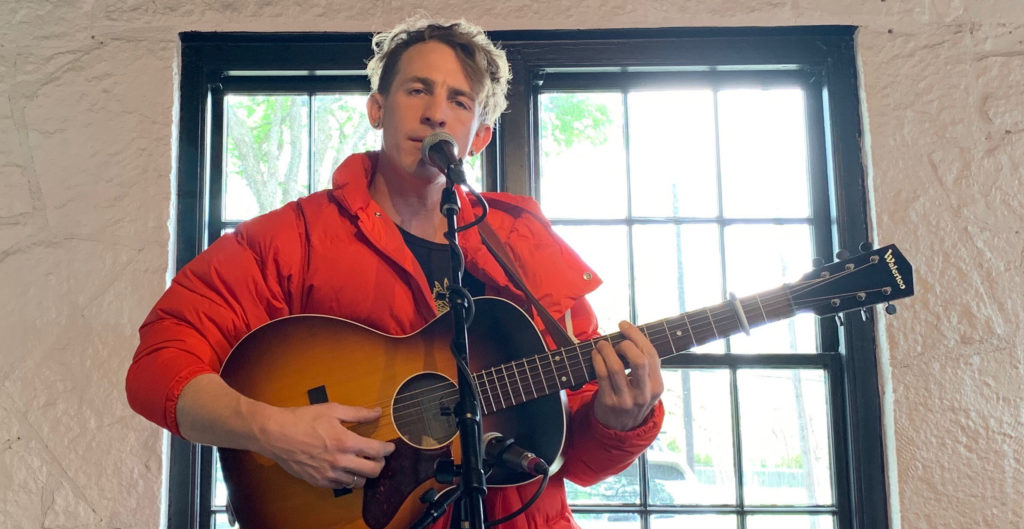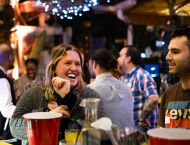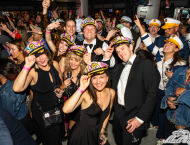Music
 Photo: Michael Coleman
Photo: Michael Coleman
Buck Meek Brings Solo Work to SXSW
March 17, 2019 @ 12:00am
Buck Meek, a Texas native who made his name as the guitar player for Brooklyn folk-rockers Big Thief, stepped away from the band momentarily last year and released his self-titled debut album.
We caught Meek’s acoustic showcase in midtown Austin on the final day of SXSW. A captivating songwriter with an unusual but inviting vocal style, Meek reeled off a half-dozen songs for an admiring mid-day audience, then he sat down for a conversation with On Tap.
On Tap: That was a quality set, Buck. Cool, intimate songs. So, you’ve lived in Brooklyn for many years now, much of that as the guitar player with indie rock band Big Thief. But you grew up near Austin, Texas in a town called Wimberly in the Texas Hill County. I’m hearing that Texas sound in your music and lyrics despite your East Coast educational pedigree. Is that intentional?
BM: I lived in Brooklyn for seven years. I grew up in Wimberly and left in 2005 to go to Berklee College of Music in Boston. I was there for five years and it was a natural migration down to Brooklyn. A lot of people in my [musical] community moved down to Brooklyn. I made a lot of friends who went to Berklee to study jazz and ended up feeling disillusioned with the institutions of jazz and started joining punk rock bands or other methods of expression around jazz.
OT: You’ve been playing indie rock for years. What prompted the shift to a more folk, singer-songwriter oriented direction?
BM: This project is all my own songs whereas Big Thief is Adrianne [Lenker]’s songs and I’m the guitar player. There is a familial spirit with Big Thief but this project under my own name is all my own material and it’s a little more intimate and definitely more based on my roots here in Texas.
OT: Since we’re at SXSW in Austin – the epicenter of Texas music- tell us more about how this place informs your music.
BM: I try to be as honest as possible in my songwriting. Naturally, it [Texas] arises. I grew up in Wimberly, Texas surrounded by a lot of the outlaw country out there. Ray Wylie Hubbard and Butch Hancock from the Flatlanders. I saw those people a lot growing up. Have you ever been to the Kerrville Folk Festival [located in the Texas Hill Country about two hours west of Austin]?
OT: Unfortunately, no. But I have a feeling it should be on our bucket list.
BM: The campgrounds out there are just an incredible variety of some of the greatest songwriters on earth, most of which have never put a record out. They’re just blue-collar workers who come out to Kerrville every year and share songs around campfires at nighttime. I’ve been going to the Kerrville folk festival since I was 13 so I was surrounded by a lot of good songwriters out there, known and unknown. That was my biggest influence as a songwriter but then I moved to New York and played all this punk rock and rock and roll and experimental music. This project is an honest reflection of all of those influences for me, I think.
OT: You opened for Jeff Tweedy of Wilco at his sold-out solo acoustic show at Austin’s Paramount Theatre earlier this month. What have you learned by touring with an Americana icon like Tweedy?
BM: Jeff reached out and I really respect how curious he is. He is always uncovering younger artists and reaching out and helping them – sharing his resources and insights. He’d originally reached out to Big Thief and we collaborated with him at the loft and developed a friendship from there. When he heard my record, he was really supportive and invited me out to be with him on the solo tour. I really look up to him and seeing him boil it down to solo with just an acoustic all by himself with just guitar and a microphone…and he’s funny. He’s so funny. And he’s playing a lot of Wilco and Uncle Tupelo songs, and solo songs, but just to hear them all in their bare form on an acoustic guitar, it is a masterclass for me. Hearing these songs naked away from Wilco on just an acoustic guitar as a skeleton of a song is so powerful.
OT:What informs that unique style and vocal phrasing of your solo work?
BM: Before I was writing songs, I grew up playing ragtime and the jazz music of Django Reinhardt, also a lot of Romanian music, New Orleans swing and Western swing. I grew up playing swing music and I think that syncopated sound is what really influenced my rhythmic phrasing in my songwriting, too, bending outside of the bar lines a lot which you here in jazz.
OT: What are you hoping to get out of SXSW?
BM: I just hope to swim every day that I’m here.







